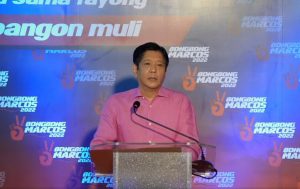The son of the late Philippine dictator Ferdinand Marcos announced yesterday his candidacy for next year’s presidential elections, reopening a long-running debate about his father’s political legacy.
Former Senator Ferdinand “Bongbong” Marcos Jr. said in a video posted on Facebook that he would bring Filipinos together to face COVID-19 pandemic, which has killed tens of thousands and upended the country’s economy. “We must face the challenge as one – as one country, as one people,” Marcos Jr. said. “I will bring that form of unifying leadership back to our country.”
In reality, Bongbong brings to the increasingly crowded presidential race the divisive legacy of his father, who ruled the Philippines for 31 years, including nine under Martial Law. During that time, Marcos oversaw the murder, imprisonment, and torture of thousands of Filipinos, and stole an estimated $10 billion from the national accounts, the remains of which are still being hunted down today, while his wife Imelda became an international byword for corrupt extravagance. Marcos was toppled from power by mass public demonstrations in 1986, and died in exile in Hawaii three years later.
Loretta Ann Rosales, a former chairwoman of the Commission on Human Rights and a political detainee who was detained and tortured during the Marcos era, told the Associated Press that Bongbong’s presidential bid “seeks to institutionalize the dark, corrupt and tyrannical legacy of his father and sabotage our efforts to exact full accountability from his family.”
“We must not allow him to use his family’s ill-gotten wealth to fund his presidential ambition, whitewash their crimes against the people and complete their quest for historical distortions,” she told the news agency.
That the son of a brutal leader could be in a position to run for president at all is testament to the power of money – in particular, inherited money – in Philippine politics. Far from facing accountability for the corruption and large-scale human rights violations of the Martial Law era, the Marcos family were allowed to return to the Philippines and to political prominence, especially in their home province of Ilocos Norte.
Imelda has served several terms in the House of Representatives, while the couple’s eldest daughter Imee was elected to the Senate in 2019, after a long spell as the governor of Ilocos Norte. Bongbong has also served in the same two positions, and narrowly lost election as vice president in 2016. The provincial administration of Ilocos Norte is very much the family business. In September 2020, the Philippine House of Representatives approved a bill officially declaring September 11, the dictator’s birthday, a public holiday in Ilocos Norte. Last month, Bongbong’s 27-year-old son Ferdinand “Sandro” Alexander announced his candidacy for the congressional post of Ilocos Norte’s first district.
As I’ve noted in these pages before, this rehabilitation is underpinned by the broader fact that the fall of Marcos and the return of competitive elections did little to change the Philippines’ skewed distributions of power. Although the new Constitution passed in 1987 explicitly banned “political dynasties,” the nation remained in the grip of a network of rich families, who as of 2013 still governed in 72 of the Philippines’ 80 provinces. Since the 1980s, the Philippine elite has fiercely resisted any attempts to break up the concentrated land holdings that underpin this unequal distribution of wealth, a reality that continues to bend Philippine politics toward oligarchy.
The material failures of the past three decades have opened up spaces for populists and former Marcos supporters to rehabilitate the Martial Law era. As Gretchen Abuso of the Philippines’ Xavier University wrote in these pages last month, “the Marcoses and their well-oiled machinery are experts in the study of collective memories of Filipinos.” They have been canny in contrasting the unvarnished present with a rose-tinted vision of the Marcos era as a time of order and progress.
An important role has been played by President Duterte, who enjoyed support from former Marcos allies during his political career in Mindanao and has repeatedly expressed his admiration for Marcos. After coming to office in 2016, he kept a campaign promise to allow Marcos’ remains to be buried in the Heroes’ Cemetery in Manila. (A survey at the time found 59 percent of respondents supported the idea.) In 2017, Duterte issued a presidential proclamation praising Marcos as a “World War II veteran, distinguished legislator, and former president.”
Public opinion surveys suggest that Bongbong has some chance. In June the local pollster Pulse Asia found he was the preferred candidate of 13 percent of respondents – a low total, but still was the third-most preferred candidate in a divided field, behind Manila mayor Francisco Isko Moreno (14 percent) and Duterte’s daughter Sara Duterte-Carpio (28 percent). With Sara not yet committed to running as her father’s successor, there is every likelihood that Marcos could end up the continuity candidate promising a continuation of the Duterte legacy. Saddled with his father’s baggage, can Bongbong Marcos “Make the Philippines Great Again, Again?”

































